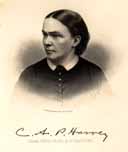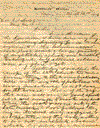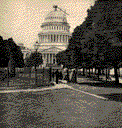

 |
 |
|
|
||
 |
Among the women whom the Civil War brought to the front as leaders, such as Dorothea Dix, and Anna Dickinson, Mrs. Cordelia A. Perrine Harvey from Wisconsin deserves a place. In some respects she was a National figure, one of the great army nurses whose work was not limited by state lines. | |
|
The early life of this remarkable woman did not differ from that of other Wisconsin women of her day, who spent their lives in small towns, busy with the daily routine. She lived for many years in Kenosha, where her father's family, the Perrines were prominent in the decade of the forties. There she taught school, and there she was married to a school teacher, Louis P. Harvey. They removed to Madison in 1859, when Mr. Harvey's election as Secretary of State made his presence in Madison necessary. Mr. Harvey was a person of strong personality and in 1861 the people of Wisconsin elected him Governor. From the day of the firing on Fort Sumpter both he and his wife showed a deep interest in the Civil War. In the busy days which followed the first call for troops, Mrs. Harvey entered with enthusiasm into the work for soldiers and their families. In the spring of 1862 Gov. Harvey went South in order to learn whether the sick and wounded Wisconsin prisoners were well cared for. He stopped at Cairo, Mound City, and Paducah, also at Pittsburg Landing. From there he went to Savannah and as he was about to pass from one boat to another, his foot slipped, and he fell in the water and was drowned before help could be secured. While this tragic event was taking place, his wife totally ignorant of the shocking incident was busily engaged in collecting money for the relief of soldiers' families. |
 Kenosha, Wisconsin |
|
 Louis Harvey |
||
 Soldier's Aid Society Office |
She was not a woman to spend her life in mourning, however, and when the intensity of her grief had somewhat lessened, she began to ask herself what her duties in life were to be. A settled conviction possessed her that her duty in life was to finish the work which he had left undone. She soon began to inquire where and how she could be most helpful to Wisconsin soldiers. In 1862 Governor Salomon appointed her Sanitary Agent at St. Louis, and for four years she rendered acceptable service in the Southland for Wisconsin soldiers. Her tact was unusual therefore she succeeded in accomplishing things which other people failed. Her motherly heart and sympathetic figure caused the men to call her the Wisconsin Angel. |
|
|
She began by visiting hospitals, in order that she might find out where improvements were most needed. Afterwards Mrs. Harvey proceeded to Cape Girardeau where hospitals were being improvised for the immediate use of the sick and dying--then being brought in. She visited day by day every sufferer's cot--taking with her all the hope and comfort she could find in her heart to give them. In 1863 Mrs. Harvey went to Memphis from which place she sent a letter to the Governor of our state urging him to establish a hospital at that place. After visiting Memphis Mrs. Harvey inspected hospitals at Corinth, Jackson and La Grange. About April 1st she was overcome by the Miasma and was obliged to return north where she recovered her health. |
 |
|
 Washington during the Civil War |
On her return trip south she visited Washington and obtained from Abraham Lincoln permission to establish a hospital in Wisconsin for convalescing soldiers. Although Mrs. Harvey was the Sanitary Agent for Wisconsin she paid little regard for the state lines and her work may be truly regarded as National. |
 |
 |
When she returned from the south in 1865 she brought with her six or seven orphans of the War, whom she had found there; not inquiring on which side their fathers fought. Soon after this she established a Soldiers Orphans Home in Madison which was in existence until 1874, when the state feeling the need for retrenchment, closed the institution. * * * *
|
 Bark River Bridge Fort Atkinson, Wisc |